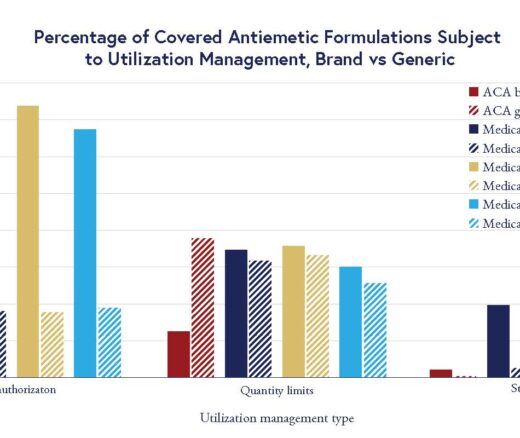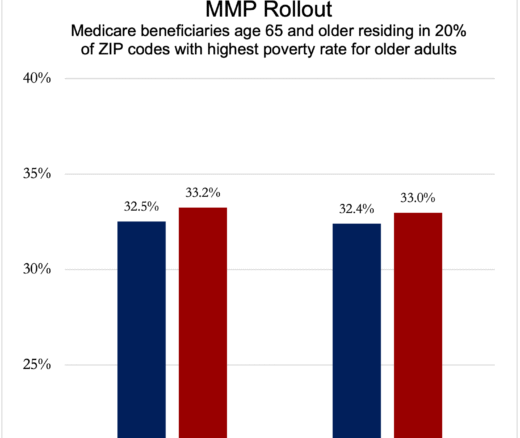
Insurers’ Utilization Management Tools Vary Widely on Anti-Nausea Drugs for Cancer
Chart of the Day: LDI Researchers Report Major Coverage Differences Across ACA and Medicaid Plans, Affecting Access to Drugs That Treat Chemo-Related Nausea
Blog Post
Consider this scenario: Once a month, you go to the eye doctor for an expensive injection for an eye problem. When you change insurance plans, the doctor tells you that you must reschedule your treatment to a later date because of a prior authorization process your new insurer requires. Although your previous plan covered the injection, your new insurer wants to assess whether that drug is needed or if a cheaper alternative would work. This inconsistency between insurers leaves you weeks without the treatment you need.
This is the kind of problem that LDI Senior Fellow Aaron Schwartz, former LDI Fellow Ravi Gupta, and others documented in a recent study. The team studied five Medicare Advantage managed care plans and found extensive and inconsistent use of prior authorization.
They examined the impacts of these coverage rules on physician services by comparing them to traditional Medicare, which does not use prior authorization, and their findings were dramatic: At least one Medicare Advantage plan would have required prior authorization for nearly half of traditional Medicare spending — and for 93 percent of physicians’ drug spending, according to their calculations.
What is Prior Authorization? According to Healthcare.gov, prior authorization is “approval from a health plan that may be required before you get a service or fill a prescription in order for the service or prescription to be covered by your plan.” It essentially is a filter by health insurers to determine if the care you need is necessary.
When launched in the 1980s, prior authorization policies were intended to discourage unnecessary use and overspending on health care services. However, these reviews have stirred debate, with providers, scholars, and policymakers expressing concerns that insurers have overused the tool, creating an administrative burden and the potential to deter appropriate care.
The American Medical Association, a professional association and lobbying group for doctors, has taken up this issue through its “Fix Prior Auth” campaign. In a recent campaign survey, 86% of physicians reported that these approval processes led to higher overall utilization of health care resources, such as additional office visits. Eighty percent of physicians also reported that these rules can sometimes lead to abandoning treatment. Additionally, the survey found that, on average, physicians and their staff spend almost two business days per week completing the approval paperwork.
The contrast in prior authorization rules differs starkly between the federally administered traditional Medicare and Medicare Advantage, which is administered by private insurers. Medicare Advantage provides the same coverage as traditional Medicare plus additional benefits and lower out-of-pocket expenses. However, private insurers have incentives to reduce costs, and using these prior reviews enables them to do that. Up to now, there was little evidence about how Medicare Advantage plans are using these practices.
The new study by Schwartz and colleagues looked at the scope of prior authorization policies across five insurers – UnitedHealthcare, Humana, CVS Health, Centene/Wellcare, and Cigna – which together serve more than 60 percent of Medicare Advantage beneficiaries. The team also assessed how often Medicare Advantage insurers’ rules required approval before covering certain medical services. Then, the investigators looked at how much money Medicare Part B spent on these services. This approach helped to identify the full extent of services subject to prior authorization, including services that the administrative hassle deterred, so that they never resulted in a prior review request or insurance claim.
The investigators cited the following key takeaways:
Earlier this year, the Centers for Medicare & Medicaid Services finalized a rule requiring plans to send prior authorization decisions within 72 hours for urgent requests and seven calendar days for standard requests, include a specific reason for denying a request, and publicly report prior authorization metrics. Some states have jumped in: Pennsylvania’s new law, for example, allows two days for urgent review and five for standard, although this measure does not include self-insured plans.
While this rule may ease some of the administrative burden, more research needs to be done to identify what exactly constitutes low-value care. Notably, insurers approve over 80% of prior authorization requests. However, it’s significant to consider that some rejected treatments may be declined due to their high costs. This raises questions: Could some rejected high-cost treatments be of high value? And how do you smooth the approval process for those?
Other policy remedies might include “gold-carding” rules, which allow certain providers to skip the prior authorization paperwork as a reward for past performance. A potential downside is that this rule could worsen inequality by rewarding clinics that have historically had more resources to complete the paperwork.
Prior authorization is important, Schwartz said, because of its broad use, but there’s a clear need for improvement. The system needs better evidence on which services are high-value and low-value so insurers can make the most reasonable coverage decisions, he added.
Better targeting of wasteful services would also ease the administrative burden. Unfortunately, since prior authorization is widely varied across insurers, “we don’t know which approach is best,” he concluded. “But these very different strategies can’t all be correct.”
The study, “Comparison of Prior Authorization Across Insurers: Cross-Sectional Evidence From Medicare Advantage” was published on March 7, 2024. Authors included Ravi Gupta, Jay Fein, Joseph Newhouse, and Aaron Schwartz.


Chart of the Day: LDI Researchers Report Major Coverage Differences Across ACA and Medicaid Plans, Affecting Access to Drugs That Treat Chemo-Related Nausea

Insurers Avoid Counties With Small Populations and Poor Health but a New LDI Study Finds Limited Evidence of Anticompetitive Behavior

A Proven, Low-Risk Treatment Is Backed by Major Studies and Patient Demand, Yet Medicare and Insurers Still Make It Hard To Use

Chart of the Day: Medicare-Medicaid Plans—Created to Streamline Care for Dually Eligible Individuals—Failed to Increase Medicaid Participation in High-Poverty Communities
Research Brief: Shorter Stays in Skilled Nursing Facilities and Less Home Health Didn’t Lead to Worse Outcomes, Pointing to Opportunities for Traditional Medicare

How Threatened Reproductive Rights Pushed More Pennsylvanians Toward Sterilization